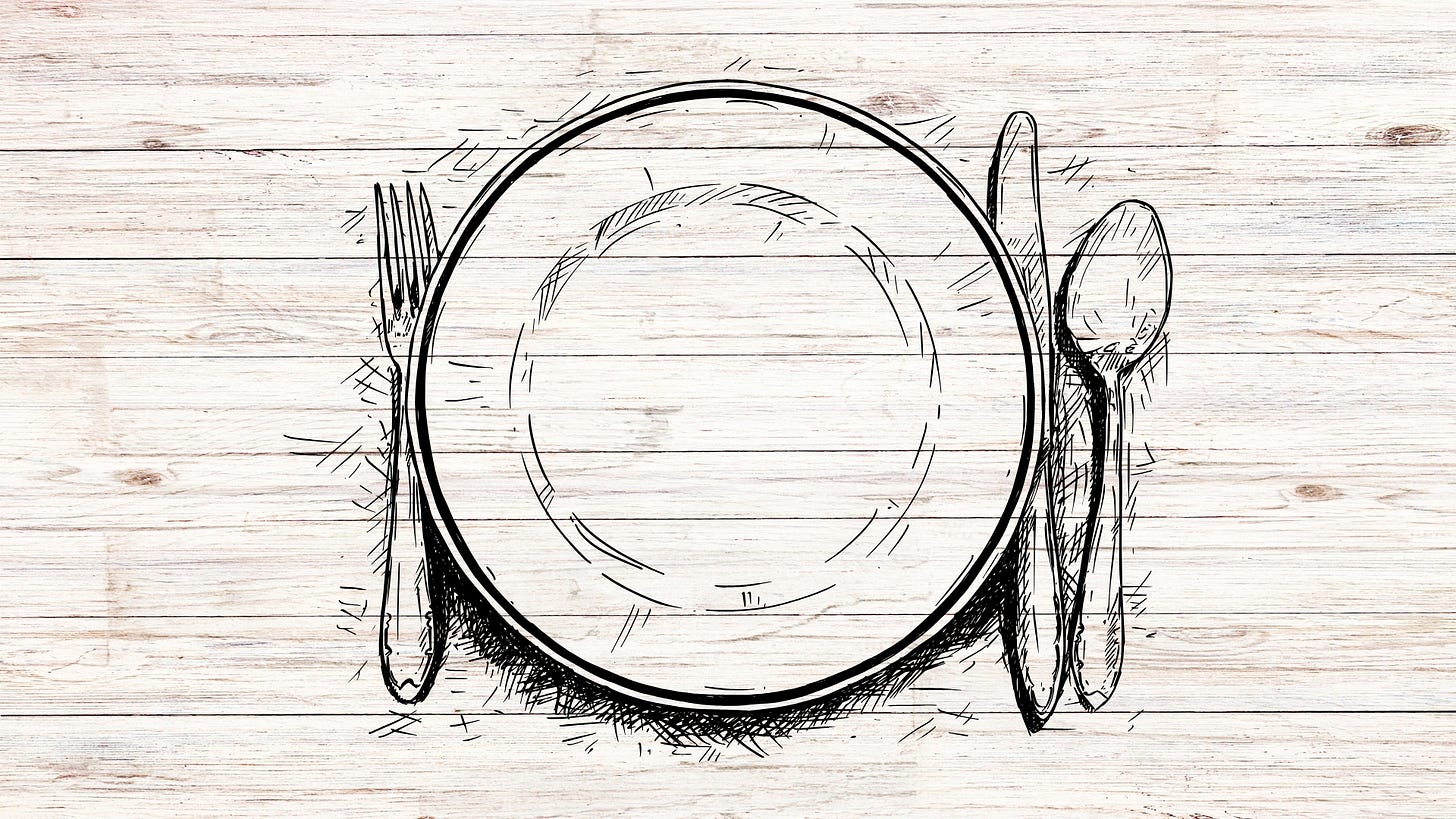The Dinner Hour
In Manchester, lunch has always been called dinner
Growing up in Manchester, we always called the midday meal dinner.
The evening meal was known to us as tea.
At school, dinner ladies patrolled the yard.
The word lunch was reserved for the warm sandwiches our mums wrapped up in cellophane for our annual class trip to Blackpool Zoo.
I never thought anything of it at the time. That was just the way it was.
In those days, I spent a lot of time with my grandparents — Nan and Pop.
They lived just seven doors away on the same side of our street.
Nan had been a mill worker and, after she retired, she always cooked up a hot dinner at midday on weekdays and made a “butty” for our tea.
Dinner cooked by Nan each morning usually meant liver and onions, or “tater ash” — a thin liquor of beef, potatoes, carrots, an onion and an Oxo cube or two.
Often she added a crust of pastry to make a homemade pie — still one of my favourite meals today.
Sometimes, Nan’s ash (the h of hash was never pronounced) also included chunks of kidney, or jelly-like globs that I would spoon carefully to the side of the plate.
“That’ll stick to your ribs,” she would say, encouraging me to gulp the globs down for my own good.
I later discovered it was cow heel.
On other days, I’d be sent to the chip shop that stood in an end-terraced house around the corner and run back to Nan’s with the first fry of the day.
It was only when I began working in offices that I heard people talk about lunch, a word I still think sounds a bit pretentious.
For me, it will always be dinner and tea.
I think it goes back to a time when weavers in Manchester, the world’s first factory city, were forced by the beat of the mill engines to have their main meal in the early afternoon.
In 1849, a journalist named Angus Reach watched as Mancunian workers marched out of their mills for their dinner at precisely 1pm.
“In Manchester everybody, master and man, dines at one o’clock,” Reach wrote of the newly industrialised town.
“As the chimes sound, all the engines pause together, and from every workshop, from every industrial establishment, the hungry crowd swam out.
“Streets and lanes, five minutes before lonely and deserted, are echoing the trampling of hundreds of busy feet.”
A prime cut of meat was not something they could afford, he said, as he watched the workers head for a cook shop for pea and ham soup.
Many though swapped the fast food of the cook shops for a hot pie at home.
“A favourite dish with the operatives is what they call potato pie — a savoury pasty made of meat and potatoes, well seasoned with pepper and salt, and roofed in with a substantial paste,” Reach said.
After wolfing down the same ash pies that Nan was still making in the 1980s, the mill men would stand at their doors sucking at their clay pipes for a few minutes before being called back across the road to the factory.
“Many of the men, after dispatching their dinner, spend the other moiety of their leisure in smoking,” Reach said, “until the never failing bell proclaims that time is up, and that the engine and its attendant mechanism are ready to resume their labours.”
And why did they only have a light meal in the evening?
Reach noted that by the time the factory workers had their midday dinner, they had been in work with only a half hour break since the machines had started at 6am.
By the end of the day the mill workers would have been at the looms for at least ten hours.
And some mills stayed open until later, leaving little time to do anything on an evening, let alone to cook a hot meal.
There was only time for them to have a little bread and a cup of tea.
“They cannot well be expected to settle down to those domestic pursuits and means of self-improvement which I am assured they are most eager to seize,” Reach wrote.
Sometimes at Nan’s house, I’d only head back home after a teatime tongue sandwich washed down with a glass of “sterra” — sterilised milk.
But it was the after-dinner routine I remember most of all.
With Nan finishing up in the kitchen, I’d follow Pop into the living room where he would light his only cigarette of the day.
Then we’d sit side-by-side in our armchairs in a comfortable silence together — watching what the TV pronouncer told us was the lunchtime news.
Tongue butties and cow heel
I hope you found this weekend’s story interesting.
Do you still call it dinner and tea as well?
I wondered if it’s just a Manchester thing, or is it the same in other cities in the North?
Please do stick a note in the comments and let me know what you think.
And do let me know as well if you had any unusual things for your dinner besides tongue and cow heel.
It must have been good for us as I was as fit as a butcher’s dog growing up and my Nan and Pop both lived into their 80s.
Nutritionists even say now that having your main meal at midday and a light tea in the evening is better for your health.
I’ve put Nan’s tater ash recipe below if you want to try it. It’s good, simple, wholesome grub for a winter’s day and easy to make too.
Have a great day and enjoy your Sunday dinner.
P.S. - If you’d like to join me on a historic walking tour where I talk about working class lives in Manchester, there are only a few places left for my dates in spring.
Nan’s ‘tater ash’ (*potato hash) receipe
Ingredients:
Stewing beef, cubed.
Enough potatoes as you can eat, quartered.
Four or five carrots, sliced.
A big onion, sliced.
Three Oxo cubes.
Salt and pepper.
A jar of red cabbage to serve.
Method:
Get a big pan and chuck the beef and the onion into it with a bit of oil.
Simmer until the beef is sealed and the onion is soft, giving it a bit of a stir while it’s cooking. Season it.
Peel and quarter the potatoes and slice the carrots and throw them in pan.
Chuck in two of the Oxo cubes and give it all a stir.
Add boiling water - as much as feels right.
Simmer for two or three hours until you the beef is good and cooked.
Add more boiling water and the third stock cube near the end so you have enough for a second meal.
For an even heartier dinner, put the cooked ash in a Pyrex bowl and add a crust of pastry and put in the oven until the pastry is cooked.








Thanks everyone for the comments, which have brought back a lot of memories for me. I'd forgotten about the spare ribs which my mum used to make, boiled in a big pan. Thinking about it, I can almost smell them now, cooking away on the gas hob. Can you still buy ribs at the butcher's? You never see them in the supermarket where meat is really expensive now. I went to buy some stewing beef the other week for the ash and couldn't believe it was priced up at over £7. I can well imagine what my Nan would have said about that. I didn't buy it anyway.
Cold slices of tongue was one of my favourite food stuffs for sunday tea as a child.
Was until the day my mother showed me the whole cow tongue she'd just bought from the local butchers to cook. Shamefully I'd not made the connection before and my reaction was a real URGH!